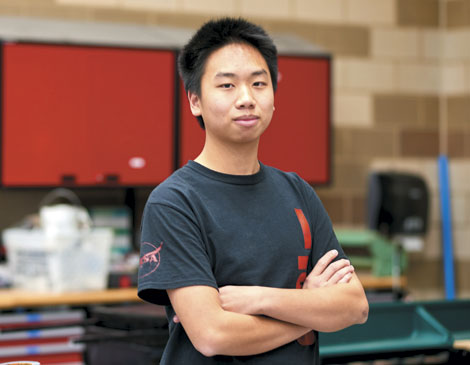Peng Zhou is a busy kid. In the last eight months, the 17-year-old built a robot for the Cleveland Police Department’s bomb squad, completed his required undergraduate coursework at Cleveland State University and works part time as a teaching assistant at Cuyahoga Community College.
“There’s a lot of things you can do with technology. It’s everywhere,” says Zhou. “[Opportunity] just comes at you.”
As was the case in October when Sean Wheeler, a faculty member at Cleveland Metropolitan School District’s Design Lab Early College High School, asked Zhou if he wanted to go to the White House later that week.
“Sure,” the laid-back Zhou recalls saying.
Zhou was selected to be one of President Barack Obama’s Kid Science Advisors, positions created last year after 9-year-old Jacob Leggette from Maryland asked the president if he had a kid science advisor during the White House’s annual Science Fair in April. As a result, non-kid science advisor John Holdren posted a call for submissions that drew more than 2,500 responses from students nationwide about how to maximize student engagement in science, technology, engineering and math education.
Zhou caught the White House’s attention after his robotics team, the Red Dragons, beat the bots of more than 900 teams from 42 countries at the First Robotics Competition in April.
One of 11 kid scientists to visit the White House, Zhou got his picture taken with President Obama and participated in a roundtable discussion with the president, NASA administrator Charles Bolden, National Science Foundation director France Cordova and former astronaut brothers Scott and Mark Kelly.
Zhou told the group about a recent project he completed and how similar projects could make the classroom more like the real world. Using a box of 12 Raspberry Pis (tiny cost-effective computers), he created a super computer cluster. Zhou leveraged the efficient processors of the Raspberry Pi to run the space program Einstein@Home, which simulates black holes and tracks galaxy expansion. The program ran at the same speed as on a desktop computer but required a fraction of the wattage and 15 percent of the cost.
“They were pretty amazed,” says Zhou. “They liked that it was for a good cause.”
The rest of the students shared how they think their generation can change the world — from transit systems to deep-sea exploration — through science and technology. For Zhou, it all boils down to embracing technology. “It opens the minds of students to a new subject,” he says. “I found myself in technology, [turning] my imaginations into something physical.”

Kid Scientists Take to the White House in the Name of STEM
in the cle
10:00 AM EST
January 11, 2017



.jpg?sfvrsn=d67cfd8c_1&w=640&auto=compress%2cformat)